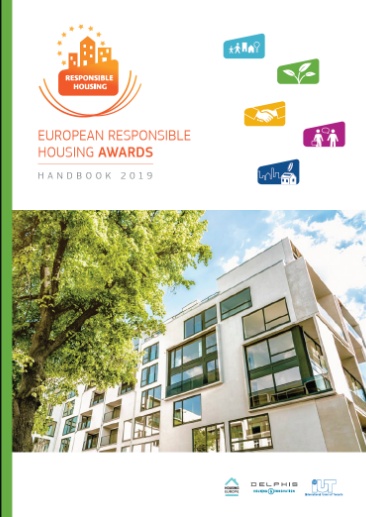This third edition of the Responsible Housing Awards saw a record-breaking number of 87 submissions (an increase of 29% compared to 2016) across five categories from 16 countries. The jury members had a tough decision at hand but in the end everyone is a winner in the responsible housing community. In this Handbook you may find out more about all 25 projects of the winners and the finalists.
Editorial – Responsible housing, a success story in progress*
One would probably expect that three years is not enough time for yet another pool of innovative and responsible housing projects across Europe to be shaped, however, public, cooperative and social housing providers have exceeded our expectations. This year, for the 3rd edition of the European Responsible Housing Awards, we received a record-breaking number of 87 submissions (an increase of 29% compared to 2016) across five categories from 16 countries (almost double compared to 2016) and so, deciding on five winners and finalists was no easy task for the Jury.
The quality of the applications received and in particular of the ones featured in the publication you are now holding in your hands is a clear indicator that more and more housing providers commit to Corporate Social Responsibility and the Responsible Housing principles.. Sometimes as you will read through the following pages this means going beyond what once seemed their traditional mission.
This is exactly the meaning of the first category ”More than a roof – supporting communities of equal opportunities”. The finalists here prove in practice that ensuring decent, affordable housing (and which will remain so in the future), understanding that this is key to avoiding social and spatial segregation and promoting social cohesion in our neighbourhoods.
“Leaders of innovation, agents of fair energy transition” provides great examples that through innovative, sustainable construction and renovation, made to the highest standard possible within the financial means available – housing associations and tenants can both reduce fuel poverty and the environmental footprint of housing stock.
The practices of the “Fair financing for housing affordability” category make the case that sustainable investment that ensures cost effectiveness and balancing of the level of services provided, related costs and how far current and prospective tenants/residents can afford them – can help with minimising housing costs as well as mitigating real estate speculation.
The leading initiatives in “Building strategic alliances, fostering community participation” highlight the fact that “No one is an island” and certainly, no (responsible) housing association works in isolation. Good communication and transparency on how and why decisions are taken, between housing associations, local authorities, tenants/residents and other stakeholders, can ensure fairer and more effective collaborations.
Finally, all great projects are results of team effort. This is clear once one looks at the projects of the “Empowering the team, addressing employees changing needs” category. Fair labour practices in a healthy, safe and positive work environment that actively promote equality and diversity are an essential starting point for the personal and professional development of employees.
25 inspiring stories, 25 reasons to feel optimistic about the future of the communities housed or influenced by the work Responsible Housing providers carry out across Europe. Read more about them, feel free to learn from them and to get in touch with the people behind the projects. Actually, there is no better place to do so than the Awards Ceremony in Lyon as part of the 2nd International Social Housing Festival.
Last but not least, stay tuned: responsible housing is a success story in progress…
* By Barbara Steenbergen, Head of IUT Liaison Office to the EU & Chair of the European Responsible Housing Awards Jury, Cédric Van Styvendael, President of Housing Europe and Francis Deplace, Delphis General Manager.
